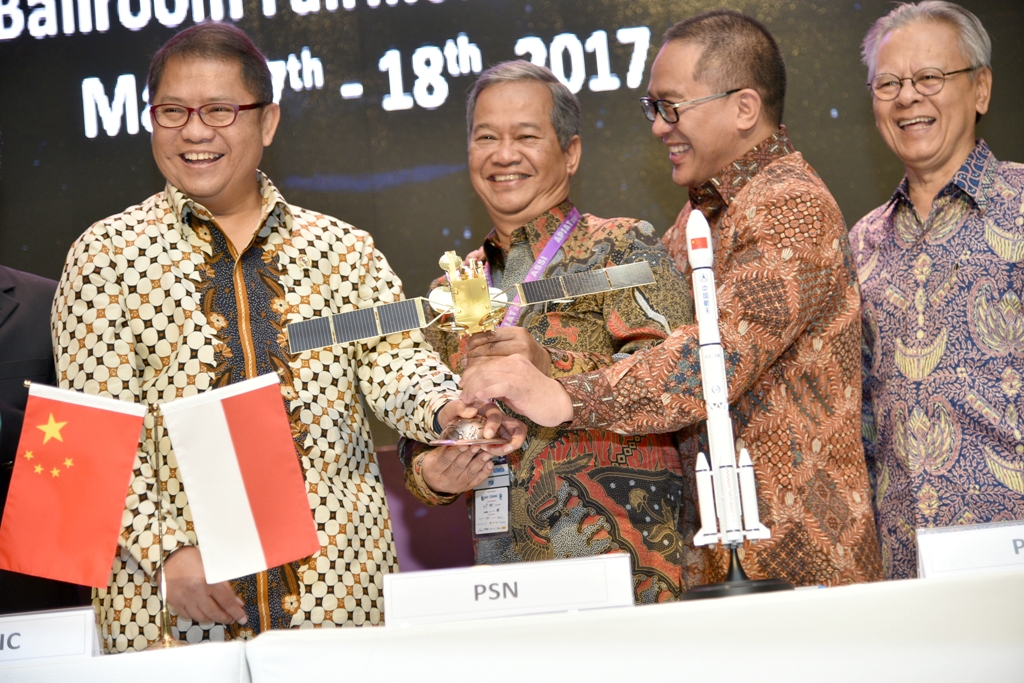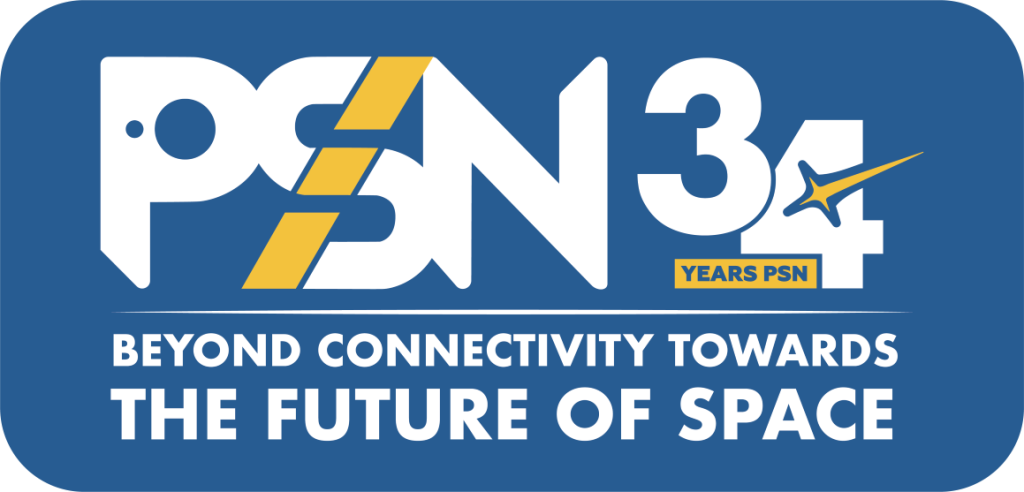JAKARTA, May 17, 2017 – PT Pasifik Satelit Nusantara (PSN) officially announced a strategic partnership in building the Palapa Nusantara 1 Satellite or abbreviated as PALAPA-N1 Satellite to provide broadcast and broadband services in Indonesia. The satellite was built through a joint venture with Indosat Ooredoo and by collaborating with China’s leading satellite manufacturer, China Great Wall Industry Corporation. The partnership is part of PSN’s commitment to supporting the national satellite independence plan.
PSN Chief Executive Officer Adi Rahman Adiwoso said that satellites are the most important infrastructure and play a very big role for Indonesia. Information technology has now become a necessity and part of the lifestyle of the Indonesian people. With the shape of Indonesia’s territory as an archipelago, satellite technology is a solution and unifier of the entire archipelago. “We support the government’s program that launched national satellite independence, and the development of the PALAPA-N1 Satellite which is a PSN initiative together with Indosat Ooredoo is our real commitment to present satellite technology that is able to provide the best service and meet the needs of dynamic customers to the remote areas of Indonesia,” said Adi Rahman.
The construction of the PALAPA-N1 Satellite was made using the tested Chinese DFH 4 Bus and will be launched with a Long March 3B rocket from the Xichang Satellite Launch Center in China. This satellite is targeted for completion in 2020 and will soon be orbited to strengthen the PSN satellite fleet. Currently, PSN has operated the VR Satellite which has been in orbit since 2014. Added to the plan to operate the PSN VI Satellite in 2019 and PSN VII in 2022, this first private satellite company in Indonesia will operate 4 satellites both directly and indirectly. The operation of these satellites will enable PSN to provide broadband services in Indonesia with a capacity of up to 130 Gbps.
If added with other satellite service providers in Indonesia, namely Telkom and BRI, the total satellite capacity in Indonesia is estimated to have services of up to 150 GBps. With the presence of this PSN satellite fleet, Indonesia will no longer depend on foreign satellite operators for satellite service usage in 2022. “That way, satellite services in Indonesia will no longer depend on foreign companies, because domestic companies are able to meet all national needs,” said Adi Rahman.
President of China Great Wall Industry Corporation (CGWIC), Yin Liming, welcomed the collaboration with PSN. The collaboration between PSN and CGWIC will have a positive impact on telecommunications services in Indonesia. “We are proud to be able to work with PSN in developing the PALAPA-N1 Satellite. We are sure that this project will be beneficial in the development of the telecommunications sector in Indonesia which is growing very rapidly today,” said Yin Liming.
A glimpse of the signing of PSN VII
On that occasion, the signing of the memorandum of understanding between PSN and China Great Wall Industry Corporation (CGWIC) for the PSN VII satellite was also PSN’s commitment to serving the needs of satellite services in Indonesia. “As a national company, we are sure that PSN VII will be able to provide quality satellite services and reach all corners of the country,” explained Adi Rahman.
CGWIC also expressed its enthusiasm for this collaboration because it will improve the reputation of both companies in the international satellite world. “And also the PSN VII satellite will provide wider connectivity throughout Indonesia which makes this collaboration highly appreciated,” said Yin Liming.
PSN Collaborates with Surya University to Develop LEO Satellite
At the same event, PSN also signed a memorandum of understanding with Surya University regarding the development of the cube sat class LEO Satellite. This collaboration is PSN’s commitment to providing the widest possible access and opportunity for the nation’s children to work in the national satellite world.
Surya University Founder, Prof. Yohanes Surya, expressed his pride in being able to collaborate with PSN. “We hope this can be an inspiration so that the nation’s children can continue to work and produce something that is not inferior to other countries. We would like to thank PSN for giving Surya University the opportunity to be directly involved in making cube sats,” said Yohanes.
PALAPA-N1 Satellite Uses High Throughput Satellite Technology
PT Pasifik Satelit Nusantara (PSN) in designing the PALAPA-N1 Satellite will use High Throughput Satellite (HTS) technology. This technology will provide broadband internet services with a much larger capacity compared to conventional satellites for the same spectrum allocation.
By utilizing this technology, the government’s program to introduce the internet throughout Indonesia can also be optimized, such as Smart Village, Universal Service Obligation (USO), or Universal Service Obligation (KPU). The USO program itself is one of the programs of the Ministry of Communication and Informatics to connect the outermost, foremost and disadvantaged villages in Indonesia with the internet.
The PALAPA-N1 Satellite will be operated and handled by PT Palapa Satelit Nusa Sejahtera (PSNS), a joint venture between Indosat Ooredoo, PSN, and PT. Pintar Nusantara Sejahtera, which is one of PSN’s shareholders. The PALAPA-N1 satellite will be in orbit at 113° East longitude and is planned to be operational in 2020.



